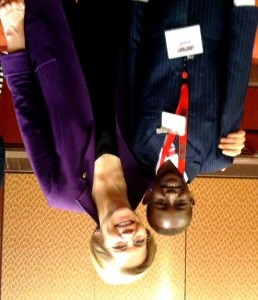Citizen Schools' Champions Advocate for Expanded Learning and AmeriCorps in Washington D.C.
Working as a non-profit partner to public schools across the country, Citizen Schools sees the many ways that public policies affect children, families, and teachers. So as a way of making a systemic impact on education beyond the handful of districts where we serve, we pull together a group of diverse stakeholders from a variety of cities and spend a day in Washington, D.C., meeting as many of our elected representatives as we can.
On Thursday, April 10, after an inspiring day meeting one another and taking a crash course in lobbying, 25 Citizen Schools leaders, seven middle school students, one school principal, and 14 representatives from corporate partners, such as Fidelity Investments, whose employees volunteer as Citizen Teachers descended on Capitol Hill.
Throughout the day the state teams met with congressional offices to discuss the impact of Citizen Schools in their districts and the success of Citizen Schools’ students. Their goal: to urge legislators to support expanded learning time (ELT), which helps public schools provide the academic and enrichment that middle schools in low-income communities need, and AmeriCorps, whose service members make expanded learning programs possible.
This year, the fifth advocacy day that Citizen Schools has organized, teams from the seven states where Citizen Schools operates (California, Illinois, Massachusetts, New Jersey, New York, North Carolina, and Texas) hustled through the hallways of the Senate and House Office Buildings, meeting in a total of 38 different offices.
The Illinois group included Rona Simmons, principal of Citizen Schools partner Schmid Elementary in Chicago, IL. She brought along a Chicago 8th grade student, Darnell, who was not only a first-time visitor to Washington D.C., but also a first-time air traveler.
He and his fellow students soon went from sightseers to advocates, sharing their personal experiences with expanded learning time provided by Citizen Schools. In a meeting with Senator Edward Markey’s (MA) office, a Boston 8th grader named Jonathan expressed his interest in becoming a lawyer and opening his own law firm someday. Senator Markey’s Senior Advisor, John Phillips, was so impressed with Jonathan that he asked him if he would be interested in a summer internship at their Boston office.
Jonathan took diligent notes during the luncheon keynote address by Jim Shelton, Deputy Secretary of the U.S. Department of Education.
“We don’t often see innovation in education,” said Shelton. “This is where expanded learning time comes in. Doing the same thing during the longer day is not the way to get breakthroughs. That’s where organizations like Citizen Schools come in. This is a model that has started to see results, proving that it is better than the status quo.”
The assembled Citizen Schools staff and partners also had the chance to hear remarks from Senator Elizabeth Warren (MA). Senator Warren was introduced by Yosef, a 6th grader from Chelsea, MA. Yosef shared what he learned in a Citizen Schools “apprenticeship” class on financial literacy that was inspired by the 50/30/20 framework from Senator Warren’s book All Your Worth. He learned about future career paths and how students can budget their potential incomes, and shared with Senator Warren, his plan to save for college to achieve his goal of becoming a teacher.
The Senator was impressed. “Citizen Schools is doing great work in Massachusetts and across the country complementing the learning that happens in the traditional school day,” she said. “High-quality expanded learning time helps students succeed in school and outside the classroom, and innovative programs like Citizen Schools can play an important role as part of addressing our nation’s educational challenges.”
The group of Citizen Schools champions spoke from many points of view--some as business-people, some as educators, some as ordinary constituents who know what their communities need. They hoped to convey to their representatives that their interests converge in public school classrooms, where the next generation of citizens are building the skills and beliefs they’ll need to lead and thrive. The meetings were most compelling when the students shared their experiences, discovering their dreams, and the paths to achieving them in schools that expanded their access to opportunities.
Those opportunities can be further enabled through good educational policy, and that’s why we took the message to the Hill. But one impact we’re sure of: with the support of Senator Warren, Deputy Secretary Shelton, and many congressional offices and leaders, we ended our time on the Hill with renewed excitement and passion for the work we lead and the students we serve.


